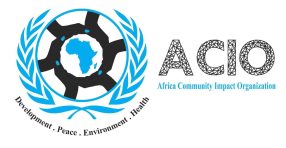There are numerous reasons why we should strive to live more sustainably and protect the environment. The foundation for sustaining our planet, community, and economy is environmental protection. Our ecosystems can grow and thrive because our environment supports and houses them. We will endanger the lives of humans, animals, plants, and others if we do not protect our environment. That’s why Africa Community Impact Organization collaborate with local communities, region organizations and International Organizations to protect environment.
Our environment’s ecosystems are intricately linked. To protect our environment, we must protect them all. After all, we live in nature and rely on it to meet our basic human survival needs. Protecting the environment entails paying our fair share in order to provide opportunities for future generations. Natural resources are depleting, and we must develop more sustainable lifestyles to support future generations.
In our daily lives, how can we protect the environment?
There are several small actions we take in our daily activities to help protect the environment. Everything in our organization begins with awareness. When communities become aware of their impact, they understand why it is critical to act. Community actions will most likely have an impact on those around them. The majority of the steps we will discuss below benefit both the environment and local communities. Last time Africa Community Organization has ringing reusable bags to the store, which has helped to reduce plastic pollution. Here are a few more things that Africa Community Impact Organization do to help protect the environment:
We educate the local community about the importance of reducing, reusing, and recycling: Do you know that you can reuse a shipping box for organizing storage rather than throwing it away immediately after opening it? Can you repurpose carrot skins for a vegetable soup before throwing them away? If it’s raining, can you put your plants outside to absorb the natural rainwater? Finding ways to reduce, reuse, and recycle resources in your daily life can help protect the environment.
Did you know that you can use reusable grocery bags for the following purposes: This eliminates the need for plastic shopping bags, which are notorious for polluting the environment. Most reusable bags are more durable than plastic bags and can carry more weight. This can make bagging groceries or purchasing new items easier.
Did you know that reusable water bottles can be used to: Reusable water bottles can keep your beverages colder for longer while reducing your use of single-use plastic. Plastic pollution can harm humans, animals, and plants. Plastic can take hundreds or thousands of years to degrade, making it extremely damaging to the environment.
Africa Community Impact Organization works with local community to volunteer and educate; we teach local inhabitants how their actions often influence others. We teach them to find ways to volunteer within their communities, such as picking up trash around their area or attending community clean-up events. We volunteering in encouraging students to plant trees for protecting environment.
For the 45 million people who live in rural areas of the Democratic Republic of Congo (DRC), there are few opportunities for livelihoods other than the exploitation of forest resources. These rural populations struggle every day to survive in a situation of general poverty, recurrent food insecurity, post-conflict instability and endemic unemployment which pushes them to exploit in an unsustainable way the immense natural capital of their country, which should , in principle, improve their quality of life and drive their development.
This very contrasting reality represents a real threat to the largest tropical rainforest in Africa: the Congo Basin. This unique ecosystem, 60% of which is on the territory of the DRC, contributes to the conservation of biodiversity and carbon storage, mitigating the effects of climate change. And even when it remains largely intact, it is slowly being eroded by an ever-growing population and demand for natural resources and land to cultivate.
Attempting to address these issues, Africa Community Impact Organization
calls for partnership with regional and international organizations to create tree plantations in previously deforested areas in the province of Tshopo, in the north of the DRC. These plantations will produce biomass to provide electricity to nearby communities, create new economic opportunities and provide jobs for the local population. We support the local economy by using degraded land to meet energy demand and relieve pressure on primary forests.
We mobilize population to Avoid sending chemicals into waterways: Chemicals are often disposed of through a drainage system that leads to rivers, lakes, or oceans. Using non-toxic chemicals for things like cleaning will help protect the environment.

PREPARED BY JANET
